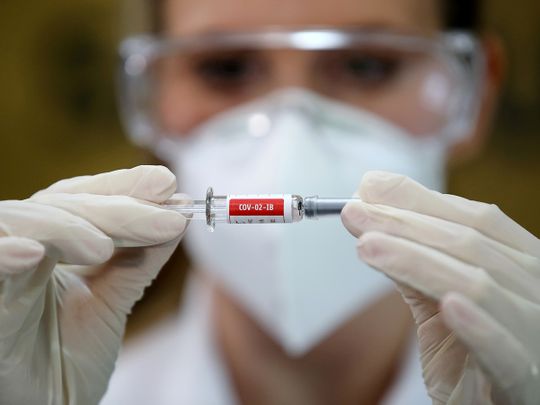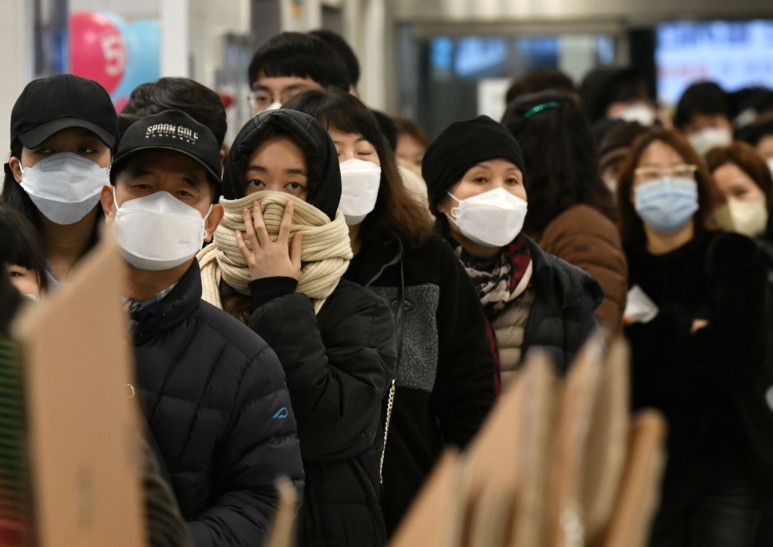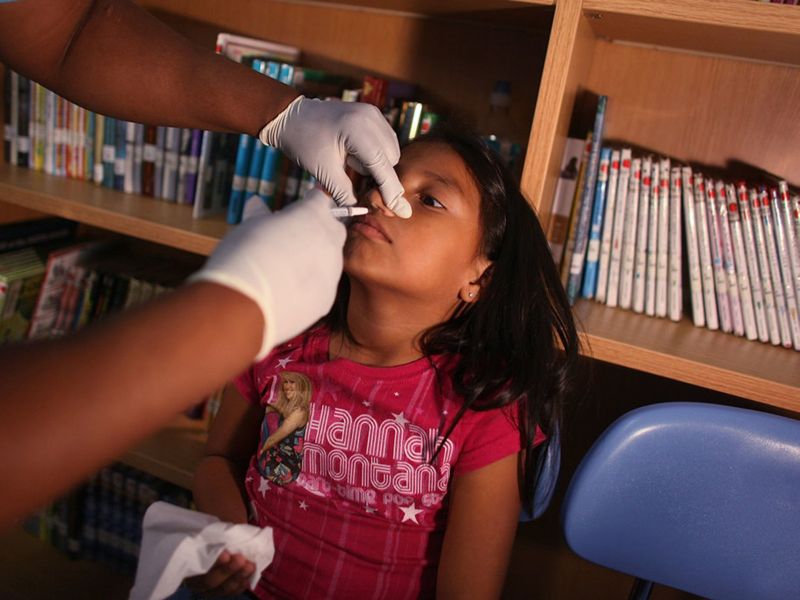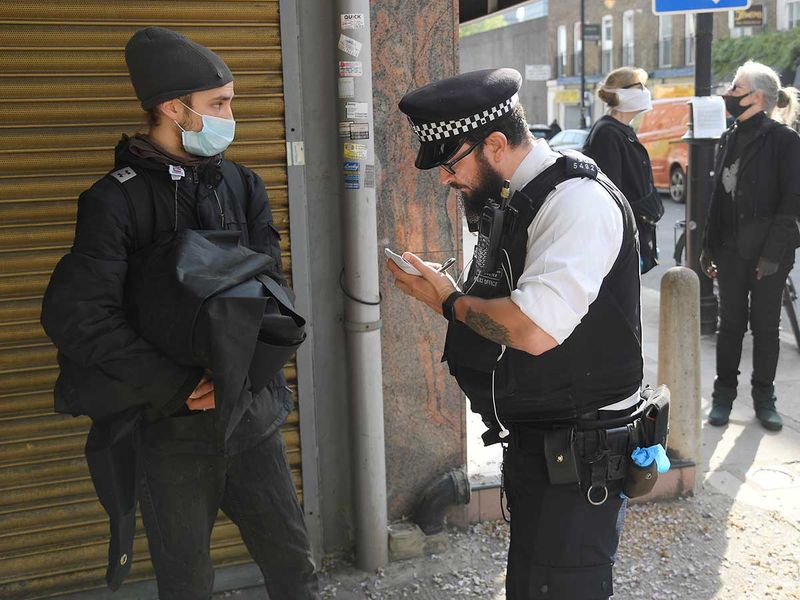
US stock index futures rose as reports related to coronavirus treatments and corporate acquisitions supported investor sentiment ahead of the Federal Reserve's policy meeting this week.
December contracts on the S&P 500 gained 1.2% as of 6:25 am in London after the University of Oxford and AstraZeneca Plc restarted a UK trial of a Covid-19 vaccine, while Pfizer Inc. Chief Executive Officer Albert Bourla said it’s “likely” the US will deploy a treatment to the public before year-end. Separately, Gilead Sciences Inc. agreed to acquire Immunomedics Inc.
Futures on the Nasdaq 100 Index climbed 1.4% after Nvidia Corp. said it agreed to buy SoftBank Group Corp.'s chip division Arm Ltd. A report said TikTok's parent ByteDance has decided it won't sell or transfer the algorithm behind the video-sharing app in any sale or divestment.
The gain in futures on Monday is “because of Gilead, AstraZeneca, Pfizer, ByteDance and Nvidia,” and it's a "very name specific rally," said Ben Emons, the head of global macro strategy at Medley Global Advisors.
"The test of the 50-day moving average is key this week. If not held as support, then that forebodes a correction driven by options that cause an unwind of leverage in tech shares."
South Korea reports fewest cases in a month
South Korea added 109 cases in 24 hours, down from 121 a day earlier and the lowest number in a month. The number of confirmed cases remained below 200 for a 12th consecutive day.
South Korea is relaxing social-distancing rules as cases ease after last month's surge. Distancing requirements for the Seoul metropolitan area will be lowered to level 2 from level 2.5 for two weeks. Level 2 forbids indoor gatherings of 50 or more people, affecting everything from weddings to amusement parks.

Pakistan's economy shows momentum as cases slow
Pakistan is showing signs of business activity picking up at a faster clip, as worries about new infections fade in an economy that contracted for the first time in seven decades. Evidence of momentum returning can be seen from growing cement-to-fuel sales and demand for home appliances to cars.
That's happening even as Pakistan added fewer than 2,900 cases last week compared with almost 35,000 cases in a week in June, and 96% of the total 300,000 infected have fully recovered.
UK tests if COVID-19 vaccines might work better inhaled
British scientists are beginning a small study comparing how two experimental coronavirus vaccines might work when they are inhaled by people instead of being injected
LONDON: British scientists are beginning a small study comparing how two experimental coronavirus vaccines might work when they are inhaled by people instead of being injected.
In a statement on Monday, researchers at Imperial College London and Oxford University said a trial involving 30 people would test vaccines developed by both institutions when participants inhale the droplets in their mouths, which would directly target their respiratory systems.
Larger studies of the Imperial and Oxford vaccine are already under way, but this study aims to see if the vaccines might be more effective if they are inhaled.
“We have evidence that delivering influenza vaccines via a nasal spray can protect people against flu as well as help to reduce the transmission of the disease,” said Dr. Chris Chiu of Imperial, who is leading the research. He suggested that might also be the case with COVID-19.
“It is critical we explore whether targeting the airways directly can provide an effective response compared to a vaccine injected into muscle,'' Chiu said in a statement.
The study is currently recruiting participants aged 18 to 55 and hopes to begin vaccinating people in London in the coming weeks.
Delivery method
Previous studies have shown vaccines delivered by inhalation require lower doses than by injection, which might help stretch limited supplies.

“It may well be that one group has the right vaccine but the wrong delivery method, and only trials such as this will be able to tell us that,” said Robin Shattock, who is leading the development of Imperial's vaccine.
The Imperial vaccine uses synthetic strands of genetic code based on the virus. Once injected into the muscle, the body's own cells are instructed to make copies of a spiky protein on the coronavirus.
That is expected to trigger, in turn, an immune response so the body can fight off any future COVID-19 infection.
By comparison, Oxford's vaccine uses a harmless virus — a chimpanzee cold virus, engineered so it can't spread — to carry (vector) the coronavirus' spike protein into the body, which should trigger an immune response.
Last week, Oxford temporarily paused its large-scale vaccination tests after one participant in the UK reported severe neurological symptoms. It was restarted on Sunday.
China OKs human trials for nasal spray coronavirus vaccine
China has approved the first phase of human trials for a potential COVID-19 vaccine administered through a nasal spray. The inoculation is being developed by researchers at Xiamen University, Hong Kong University, and vaccine maker Beijing Wantai Biological Pharmacy Enterprise, according to Bloomberg News.
This is the 10th such candidate from China to proceed to the crucial stage of human testing. The spray contains strains of the weakened flu virus with genetic segments of the coronavirus’s spike protein. Once in the body, it mimics the natural infection of respiratory viruses to stimulate the body’s immune response against the pathogen that causes COVID-19, Science and Technology Daily reports. The paper is affiliated with China’s Ministry of Science and Technology.
Iran to soon start human trials for anti-coronavirus vaccine
Iranian medical scientists will soon start human trials for an anti-coronavirus vaccine after the stage of animal trials has passed, official news agency IRNA reported. “We hope these activities will bear the desired result in order to provide better preventive services for the people,” Jalil Koohpayehzadeh, dean of Iran University of Medical Sciences and a member of Tehran anti-coronavirus committee, told IRNA.
As neither a working vaccine nor a specific drug has yet been produced against the COVID-19 infection, Koohpayehzadeh urged the people to strictly follow health instructions to prevent the spread of the deadly disease. Iran's confirmed COVID-19 cases hit 402,000 on Monday, including 23,157 fatalities. The country confirmed its first case of the virus on February 19.

UK reserves up to 190 million vaccine doses from Valneva
PARIS: Britain has secured access to up to 190 million doses of a potential coronavirus vaccine from Valneva in deal worth as much as 1.37 billion euros, the French-Austrian vaccine firm said Monday.
It had already been disclosed in July that the British government had reserved 60 million doses of Valneva's inactivated SARS-CoV-2 vaccine under development.
The firm said it expects to begin trials of the two-dose vaccine in December and if it is successful for it to become available in the second half of 2021.
The 60 million doses supplied to Britain in 2021 would come at a cost of 470 million euros ($557 million).
Britain will then have options on 40 million doses in 2022 and between 30 and 90 million across 2023 to 2025, which would cost 900 million euros. Shares in Valneva jumped more than 20 percent in early morning trading in Paris.








